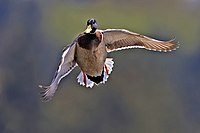Bird Flu found in Africa
Wednesday, February 8, 2006
The H5N1 Avian Flu virus, also known as Bird Flu, has been found in Nigeria by Italian scientists. Tests done on samples in a laboratory confirm that the strain is the one that can kill people, although no human cases have been reported said the Paris-based United Nations body. This is the first time is has appeared on the continent.
Reports say tests of the virus closely resemble the virus in Asia. The virus has been discovered in poultry flocks in a large Nigerian farm. "It is the first report of the disease in Africa," the Paris-based World Organization for Animal Health (OIE) said on Wednesday.
"It's going to be very difficult to mount an eradication campaign," said Dr. Alex Thiermann, president of the OIE's international animal health code, from Paris, France. "With what we have today, it is a highly pathogenic H5N1 - the same, or very closely related to the previous ones," said Thiermann. He also added, "a full genetic analysis of sample viruses is expected to be completed by late Thursday."
Maria Zampaglione of the Paris-based OIE said "An outbreak has been detected. A local poultry farm keeping 46,000 birds was affected, of which 42,000 were infected and 40,000 of those, died." The farm is located in Jaji, which is a village in the northern state of Kaduna.
"The farm is located near the Niger Delta, one of the largest over-wintering areas for wild birds in Africa." said Thiermann.
Quarantine measures on the control and movement of poultry have been taken, and the farm has been disinfected said Nigerian authorities.
"However, it is too early to say how serious the outbreak is and how big its spread could be," said Ilaria Capua of the Italian bird flu centre in Padua. "We have to be cautious in evaluating the possible implications of these findings."
In Rome, Samuel Jutzi, a director of the UN's Food and Agriculture Organization said, "if the situation in Nigeria gets out of control, it will have a devastating impact on the poultry population in the region. It will seriously damage the livelihoods of millions of people and it will increase the exposure of humans to the virus."
"When you have 46,000 chickens in a house, usually you have some degree of biocontainment...So these (chickens) are not likely to be the ones to first encounter migratory waterfowl," Thiermann said.
Wildlife circles have been debating on whether or not wild birds are spreading the virus around the globe. Experts believe they are playing a role but most believe poultry movement, poultry products and poultry manure is the main cause of the spreading of the virus.
"But probably not in this case," said Thiermann. "While it's too early to blame the wildlife, it's very likely to be in an area that's remote enough that it's not likely to be associated with international trade."
OIE spokeswoman Zampiglione also said, "Experts had been fearing an African outbreak for months. The conditions there are more likely to lead to contagion from birds to man."
Sources
[edit]- "Bird flu outbreak reaches Africa" — CBC News, February 8, 2006
- "Italian scientists find bird flu in Africa" — Xinhua, February 8, 2006
- Helen Branswell. "Deadly bird flu strain found in Nigeria, first case in Africa" — Canada.com, February 8, 2006
- "NIGERIA: First confirmed cases of killer bird flu in Africa" — Reuters, February 8, 2006


